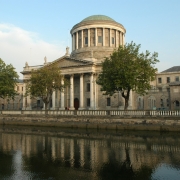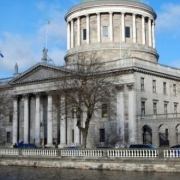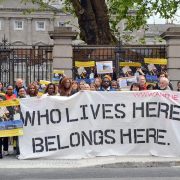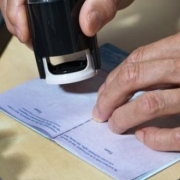Berkeley Solicitors are delighted to congratulate our client who won her appeal in the Supreme Court today in the joint test cases of – M.A.M. (Somalia) v The Minister for Justice and Equality and K.N. (Uzbekistan) and Others v The Minister for Justice. The judgement of Mr Justice McMenamin was a unanimous judgement of the Supreme Court in favour of the appellants, and was delivered on the 19th June 2020.
The judgement is very significant as it affects not just the individual families taking the appeal, but approximately fifty other applicant families who have cases pending in the High Court holding list awaiting the outcome of this Supreme Court appeal.
The case arose from a challenge to the decision of the Minister for Justice to refuse family reunification to our client’s family members under The Refugee Act of 1996 (as amended). The sole reason for the Minister’s decision was the fact that our client had become an Irish citizen by naturalisation prior to her family reunification application, and the Minister held she was not therefore entitled to the family reunification rights as a refugee.
During the course of the proceedings, the Minister accepted that the Department of Justice had previously interpreted Section 18 of the 1996 Refugee Act to permit naturalised refugees to apply for family reunification for their family members, and this favourable scheme was in operation between 2010 and October 2017. The Minister also accepted that in October 2017, following new legal advices, the Minister commenced a new procedure to preclude naturalised refugees from applying for family reunification. This change in policy resulted in many naturalised refugees being refused family reunification during the period of 2017 and 2018, prior to the commencement of the family reunification provisions of the International Protection Act 2015.
The Minister argued that in order for a person to have rights to family reunification under Section 18 of the 1996 Act, not only must they hold a declaration confirming their refugee status, but they must also be a refugee in line with the definition of a refugee in Section 2 of the Act. As this definition requires a person to be outside their “country of nationality” to be a refugee, the Minister’s argument was that a refugee who becomes naturalised is no longer deemed to be a refugee as they are not outside their country of nationality, when that country becomes Ireland.
The Supreme Court disregarded this argument, holding that there was nothing to suggest in the Act that the appellants’ “country of nationality” had altered from Somalia and Uzbekistan to Ireland, as their well-founded fear of persecution remained in those countries and not Ireland.
The Supreme Court carried out a detailed statutory interpretation exercise in respect of the 1996 Refugee Act, and highlighted the absurdities that would follow if a refugee with a declaration of refugee status would also have to be “deemed” to be a refugee in order to avail of the important rights of family reunification.
The court stated:
“The consequence of the interpretation urged by the Minister would be to create substantial legislative uncertainty when the purpose of the 1996 Act was to achieve clarity. The case advanced would run counter to the legislative aim of the Oireachtas, which was, by a carefully devised procedure defined in the Act, to identify one definitive “mark” of recognition to persons who were entitled to refugee status in this State, which, in turn, would grant them benefits and entitlements.”
In conclusion, the Supreme Court held as follows:
“This judgement concludes that the fact that the appellants became citizens did not deprive them of the right to apply for family reunification under s.18 of the 1996 Act.”
This is a very welcome decision from the Supreme Court, because it gives certainty to the definition of a refugee and the interpretation of the family reunification provisions in the 1996 Refugee Act.
In effect it means that all the decisions issued by the Minister during the period of 2017 and 2018 to refuse applications for family reunification under the 1996 Act because the sponsors were refugees who had naturalised as Irish citizens, were unlawful.
It also means that the decisions granting family reunification to naturalised refugees during the 2010 to 2017 period are lawful, bringing legal certainty to the status of countless families now settled in Ireland.
We would expect that Minister will now agree to withdraw these previous unlawful decisions refusing family reunification, and reconsider and re determine the applications in line with the Supreme Court’s judgement.
We welcome the clarity that this judgement brings and look forward to working with our clients to have the unlawful family reunification decisions withdrawn and re determined.
The full judgement can be read here.
We are happy to advise further to anyone believes they are affected by this judgement.
Berkeley Solicitors









